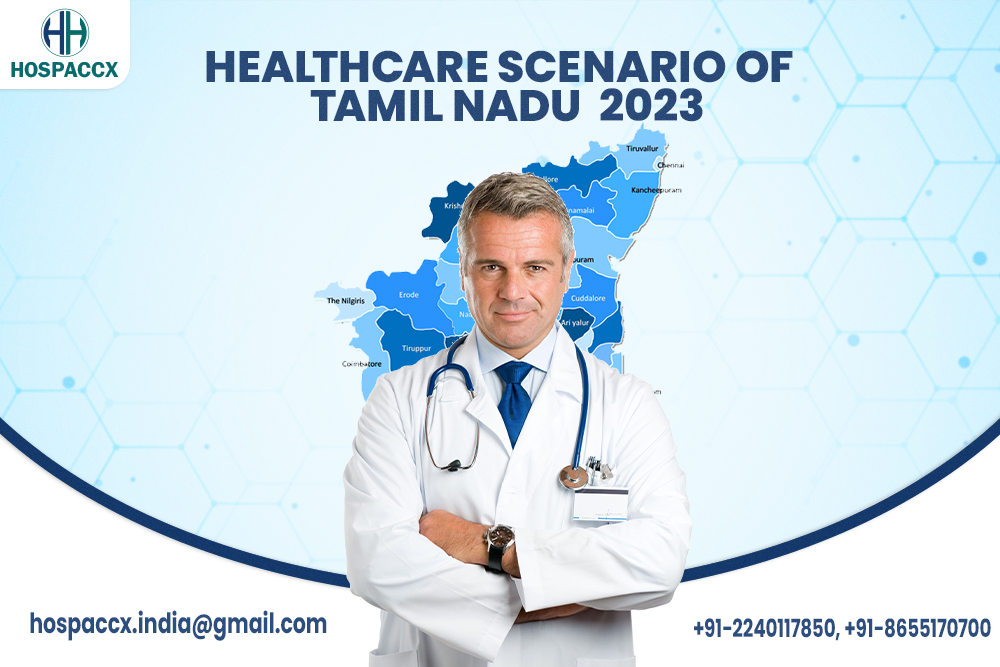Are you currently looking into venturing or investing into the healthcare sector of Tamil Nadu? Are you looking for concrete details on the current status of the Healthcare scenario in Tamil Nadu? In this article, Hospaccx Healthcare Consultancy brings to you the latest bits of Information on Tamil Nadu’s current Healthcare Systems.
INTRODUCTION
Tamil Nadu, a state nestled in the southern part of India. Boasting a rich cultural heritage, breathtaking landscapes, and a population of over 76 million, Tamil Nadu is a dynamic region that thrives on progress and innovation. With a resolute focus on improving healthcare services and infrastructure, Tamil Nadu has been ardently working to address the diverse healthcare challenges faced by its people. The state’s commitment to enhancing health outcomes, promoting disease prevention, and fostering healthy living is evident through a myriad of government initiatives. In this blog, we will delve into the multifaceted healthcare landscape of Tamil Nadu, uncovering the array of budget allocation, medical facilities, and government initiatives that contribute to the well-being of its citizens.
DEMOGRAPHIC PROFILE

HEALTHCARE BUDGET ALLOCATION IN TAMIL NADU

HEALTHCARE SECTOR COMPOSITION

HEALTH INDICATORS

DISEASE BURDEN IN TAMIL NADU


HEALTHCARE INITIATIVES BY TAMIL NADU GOVERNMENT

LIST OF MAJOR HOSPITALS IN TAMIL NADU
Government Hospitals in Tamil Nadu
- Rajiv Gandhi Government General Hospital, Chennai: Established in 1664, institute has a capacity of 2722 beds, 52 OT’s and occupies a total area of 31,559 sq. meters in BLOCK 1 and 33,304 sq. meters in BLOCK 2, offering a wide range of medical services and specialties.
- Madras Medical College, Chennai: Established in 1835, offers comprehensive healthcare services with a capacity of over 2720 beds, 231 ICU beds and campus is spread over an area of 3,25,000 sq. feet.
- Government Stanley Medical College and Hospital,Chennai: Established in 1938 is a prominent healthcare institution. It serves a wide range of medical services with a capacity of 1580 beds and caters to the healthcare needs of the region. The campus is spread over an area of 49.5 acres.
- Government Roya pettah Hospital, Chennai: Established in 1911, offers comprehensive healthcare services with a capacity of over 712 beds.
- Government Kilpauk Medical College and Hospital, Chennai: Established in 1960, offers comprehensive healthcare services with a capacity of 530 beds, 13 OT’s. Campus is spread over an area of 8 acres.
Private Hospitals in Tamil Nadu
- Sri Ramachandra Medical Centre (SRMC), Chennai: Founder in 1985, it is a leading private hospital with a capacity of about 1500 beds, and covers an area of around 175 acres, offering comprehensive healthcare services and specialized treatments.
- MIOT International, Chennai: Established in 1999, is a multi-specialty hospital with around 1000 beds and occupies an hospital area of 14 acres, providing advanced healthcare facilities and services to patients.
- Apollo Hospitals,Chennai: Established in 1983 is a well-known hospital with around 560 beds, with 46 ICU beds, and is spread over 23,000 sq. feet of land and providing advanced healthcare services, including specialized treatments and diagnostics.
- Kauvery Hospital, Chennai: Established in 1999, Hospital is a multi-specialty hospital with around 300 beds, kauvery would have 750 beds in Chennai together with its existing facility at alvarpet and radical road providing advanced healthcare facilities and services to patients.
- Fortis Malar Hospital, Chennai: Established in 1992, has a capacity of over 250beds,75 ICU beds, 6 OT’s and is spread over 1,50,000 sq. feet of land
Medical Colleges in Tamil Nadu
- Christian Medical College (CMC),Vellore: Established in 1900, One of the largest hospitals has a capacity of 2,858 beds, 207 ICU beds and occupies a total area of over 200 acres, offering a wide range of medical services and specialties. The institute has an intake of 100 MBBS seats.
- Madras Medical College,Chennai: Established in 1835, offers comprehensive healthcare services with a capacity of over 2720beds, 231 ICU beds and campus is spread over an area of 3,25,000 sq. feet. The institute has an intake of 250 MBBS seats. It has been playing a crucial role in catering to the healthcare needs of the local population.
- Government Stanley Medical College and Hospital, Chennai: Established in 1938 is a prominent healthcare institution. It serves a wide range of medical services with a capacity of 1580 beds and caters to the healthcare needs of the region. The campus is spread over an area of 49.5 acres. The institute has an intake of 250 MBBS seats.
- Sri Ramachandra Medical Centre (SRMC), Chennai: Founder in 1985, it is a leading private hospital with a capacity of about 1500 beds,114 ICU beds, 25 OT’s and covers an area of around 175 acres, offering comprehensive healthcare services and specialized treatments. The institute has an intake of 250 MBBS seats.
- PSG Institute of Medical Sciences & Research, Coimbatore: Established in 1985, offers comprehensive healthcare services with a capacity of over 1400 beds, campus is spread over an area of 100acres. The institute has an intake of 250 MBBS seats.
- Government Kilpauk Medical College and Hospital, Chennai: Established in 1960, offers comprehensive healthcare services with a capacity of 530 beds, 13 OT’s. Campus is spread over an area of 8 acres. It is known for its state-of-the-art infrastructure, dedicated staff, and commitment to providing advanced medical care to patients. The institute has an intake of 150MBBS seats.
HEALTHCARE INVESTMENT OPPORTUNITIES IN TAMIL NADU
- Growing population:
The population of Tamil Nadu for the year 2023 is 76,581,545and is estimated to project 79,000,000 by the year 2030 with annual growth rate of 3.16%.
- Captivating Tourist Influx:
- The first-ever International Medical Value Travel Summit for Tamil Nadu was opened in Chennai by Chief Minister M K Stalin. The summit aims to establish a global platform to offer medical facilities and healthcare services to foreign visitors to Tamil Nadu. Participants in this summit, which was held in Tamil Nadu and had the theme “Tamil Nadu – Where the world comes to heal,” included many foreign delegates.
- 80 crore tourists visited Thanjavur in 2018–19, and a similar number did the year after that. The number decreased during the Covid period, but it has since begun to increase since 65 lakh people visited Thanjavur last year, 62 lakh tourists have visited over the past four months, and by the end of this yearthe number will surpass one crore.
- Gap in medical Infrastructure:
- In the state, the total number of available beds, including both government and private sectors, is 65,000. According to the norms, there should be 5 beds per 1,000 population. Hence, there is a need for 3,82,907 beds, indicating a gap of 3,17,907 beds in Tamil Nadu healthcare infrastructure.
- Currently there are 993 diagnostic centres in Tamil Nadu. As per the norms there should be 1 diagnostic centre per 10,000 population. Therefore, there is a requirement of 7,658 diagnostic centre indicating a gap of 6,665 diagnostic centre in the Tamil Nadu.
- Government assistance in healthcare facility establishment:
Guidelines for availing Capital Subsidy
- 25% capital subsidy on eligible machinery valued up to Rs. 150.00 lakh.Additional capital subsidy of 5% on the value of eligiblemachinery for businesses founded by women, members of underrepresented groups, people with disabilities, and transgender people, up to a maximum of Rs. 5.00 lakh.
- 10% additional capital subsidy for microbusinesses on the value of their investment in plant and equipment, up to a maximum of Rs. 5.00 lakh.
- All currently operating Micro and Small Manufacturing Enterprises established anywhere in Tamil Nadu that move up a category by engaging in expansion or diversification are eligible for 5% additional capital subsidy, subject to a scaling-up cap of Rs. 25 lakhs.
Key Policy Incentives:
- 20% of the land area in SIPCOT Industrial Parks will continue to be set aside for MSMEs.Social infrastructure must receive 15% of the Industrial Park’s area over 500 acres.
- A 500-crore rupee industrial ecosystem fund will be established to support the development of small infrastructure projects and ecosystems.
- Research and Development in Emerging Sectors and Technology Adoption in Existing Industries are supported by the Research & Technology Fund, which has a corpus of INR 100 Cr.
- Program for Digital Accelerators to Support Startups 10% of the capital raised may be given as a grant up to INR 1 Cr. per Start-Up when investing in Tamil Nadu from the US in a variety of industries.
CONCLUSION
In conclusion, the healthcare scenario in Tamil Nadu has illuminated a tapestry of resilience, progress, and dedication in the pursuit of better health outcomes for its population. The state government, along with various initiatives and schemes, has been working towards addressing the challenges faced in healthcare infrastructure, resource availability, and disease burden. Efforts have been made to strengthen healthcare delivery by increasing the number of hospitals, primary health centres, and community health centres across the state. While challenges remain, the healthcare sector in Tamil Nadu is on a positive trajectory, with ongoing efforts to enhance healthcare access, infrastructure, and services. To bridge this gap, efforts may be required in improving healthcare infrastructure to meet the needs of the population effectively.
Above is the superficial and macro level study for in-depth market and financial feasibility studies or any other healthcare-related research needs, please feel free to reach out to us at +91-8655170700 or email us at hospaccx.india@gmail.com. Our team is equipped to provide comprehensive and detailed insights tailored to your specific requirements.

